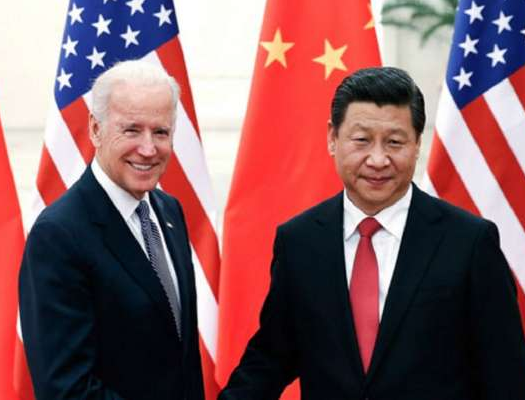Washington/Beijing: US President Joe Biden spoke with his Chinese counterpart Xi Jinping and discussed topics where the interests of the two countries “converge” and areas where their interests, values, and perspectives “diverge”, the White House said, amid deepening “competition” between the world’s two largest economies.
The US and China have been locked in a standoff fuelled by major disagreements on issues like trade, technology, Beijing’s aggressive moves in the South China Sea and human rights. Earlier this year, high-level talks between the Biden administration and Beijing were fraught with tension – with officials on both sides exchanging sharp rebukes in public.
“The two leaders had a broad, strategic discussion in which they discussed areas where our interests converge, and areas where our interests, values, and perspectives diverge,” the White House said in a statement on Thursday after Biden initiated the nearly 90-minute conversation.
“They agreed to engage on both sets of issues openly and straightforwardly. This discussion, as President Biden made clear, was part of the United States’ ongoing effort to responsibly manage the competition between the United States and the People’s Republic of China.”
Biden addressed cyber issues during the conversation, and generally sought to have a “broad and strategic discussion” about how to manage the competitive US-China relationship to avoid veering into conflict, CNN quoted a senior administration official who spoke with reporters before and after the call.
The official described the tone of the call, which Biden took from the Treaty Room of the White House residence, as “respectful” and “familiar and candid.”
President Biden underscored the United States’ enduring interest in peace, stability, and prosperity in the Indo-Pacific and the world and the two leaders discussed the responsibility of both nations to ensure competition does not veer into conflict, the statement issued by the White House said.
In Beijing, Chinese Foreign Ministry Spokesman Zhao Lijian, responding to a question on the Xi-Biden conversation, said that China and the United States are respectively the biggest developing country and the biggest developed country.
“Whether they can handle their relationship well bears on the future of the world. It is a question of the century to which the two countries must provide a good answer. When China and the United States cooperate, the two countries and the world will benefit; when China and the United States are in confrontation, the two countries and the world will suffer,” Zhao said.
“Getting the relationship right is not an option, but something we must do and must do well,” he said.
With the international community facing many common challenges, China and the United States need to show broad vision and shoulder great responsibilities, he said.
“The two countries should look ahead and press forward, demonstrate strategic courage and political resolve, and bring China-US relations back to the right track of stable development as soon as possible for the good of the people in both countries and around the world,” the spokesman said.
He also said that both presidents agreed that in-depth communication between them on China-US relations and major international issues is very important for steering the bilateral ties in the right direction.
They agreed to maintain frequent contact by multiple means and instruct officials at the working level to intensify the work, conduct extensive dialogue and create conditions for the further development of bilateral ties, Zhao added.
The Biden administration has said the US. Welcomes competition with China, but wants to cooperate in areas of common interest, like climate change. But Chinese officials say it is unrealistic for the US to expect cooperation while also taking steps that Beijing sees as harming China’s core interests.
US media reports quoted a senior Biden administration official saying said the idea for Thursday’s call was born of frustration with a perceived unwillingness on the part of lower-level Chinese officials to “engage in serious or substantive conversations.”
US-China high-level meetings since Xi and Biden’s first call in February have yielded little progress on a slew of issues, from human rights to transparency over the origins of COVID-19 in the Chinese city of Wuhan.
During the ensuing months, the two sides have lashed out at each other, often resorting to vitriolic public attacks, slapping sanctions on each other’s officials and criticising the other for not upholding their international obligations.
China has repeatedly told the US to stop interfering in its internal affairs and accuses Washington of “smearing” the ruling Communist Party led by President Xi.
Both countries have been locked in a bruising trade battle that began in 2018 under then President Donald Trump. The US had imposed tariffs on more than USD 360 billion of Chinese goods, and China retaliated with tariffs on over USD 110 billion of American products.
The US and China are also at odds over the Chinese military’s aggressive activities in the resource-rich South China Sea.
Beijing claims almost all of the 1.3 million square mile South China Sea as its sovereign territory. But neighbouring countries like Brunei, Malaysia, the Philippines and Vietnam have competing claims over the disputed maritime area which is a prominent shipping passage for global trade.
The US has been periodically sending its naval and air patrols through the South China Sea, challenging China’s claims of sovereignty over the area and also asserting the freedom of navigation.
A US warship sailed near the Spratly Islands in the South China Sea on Wednesday, days after China imposed new maritime identification rules that include the disputed body of water.
The USS Benfold, a destroyer, sailed within 12 miles of Mischief Reef, a portion of the Spratly Islands upon which the Chinese have built military facilities.
Despite the opposition, Beijing has continued to expand its military presence in the area while maintaining that its intentions are peaceful.
PTI

